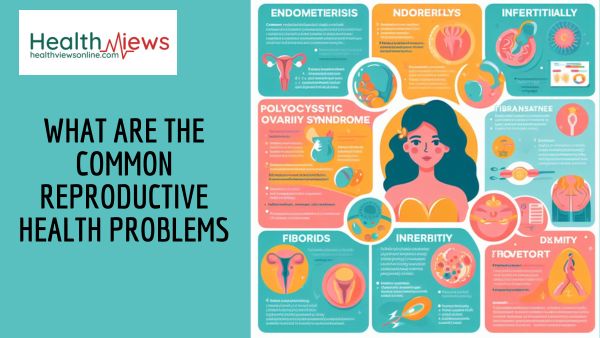Reproductive problems include a wide range of health conditions that can impact both male’s and females’ reproductive systems and functions. Internal and external sex organs, as well as hormone-producing glands such as the pituitary gland in the brain constitute reproductive systems. These common reproductive health problems can have an effect on a person’s capacity to produce children, maintain sexual health, and live a healthy reproductive life.
Taking care of your reproductive health is crucial for having a fulfilling and safe sexual life. It also allows people to decide when and how they want to reproduce or have a baby. Here you will get some common problems with reproductive health.
Top 10 Common Reproductive Health Problems with Symptoms, Prevention and Care Tips
1. Sexually Transmitted Infections (STIs)
Symptoms – Genital itching, burning, discomfort, discharge, or blisters.
Prevention – Use condoms when having sex, be vaccinated (such as with the HPV vaccine), and have frequent STI screenings.
Care tips – If you think you may have an STI, get medical help right away. To prevent reinfection, finish taking recommended meds and inform sexual partners.
Also, watch health views web stories: 8 Common Health Problems After Menopause
2. Infertility
Symptoms – Difficulty conceiving after a year of regular, unprotected sex.
Prevention – Maintain a healthy lifestyle, treat underlying health disorders, and seek medical assessment if you have reproductive concerns.
Care tips – If you are experiencing infertility, see a fertility professional. Medication, assisted reproductive technologies (ART), or surgery may be used as treatment alternatives.
Also Read: 5 Reasons Why Condoms Break and What You Should Do
3. Polycystic Ovary Syndrome (PCOS)
Symptoms – Irregular periods, ovarian cysts, weight gain, and hormone abnormalities.
Prevention – Maintain a healthy diet and exercise on a regular basis.
Care tips – For diagnosis and management, see a healthcare provider. Treatment options include dietary changes, medicines, and hormone therapy.
Also Read: Understanding PCOS In Women: Symptoms, Diagnosis, Treatment
4. Endometriosis
Symptoms – Pelvic pain, difficult periods, and reproductive issues are some of the symptoms.
Prevention – Endometriosis is incurable. However, you can lessen your chances of developing it by lowering your body’s estrogen levels. During your menstrual cycle, estrogen helps to thicken the lining of your uterus.
Care tips – Pain control. Over-the-counter pain relievers such as paracetamol, nonsteroidal anti-inflammatory medicines, or naproxen have been found in studies to be effective. Seek out physiotherapy, Try to manage your tension and worry.
Also, watch health views web stories: 8 Best Home Remedies for Hemorrhoids
5. Fibroids
Symptoms – Symptoms include heavy menstrual bleeding, pelvic pain, and lower abdominal pressure.
Prevention – Uterine fibroids cannot be prevented, only a small fraction of these tumors require therapy. However, you may be able to reduce your fibroid risk by making healthy lifestyle choices like keeping a healthy weight and consuming fruits and vegetables.
Care tips – Make yourself at ease. If your fibroids are causing painful periods, consider lying down and raising your legs with a pillow. Or lie on your side and draw your knees into your chest to relieve strain on your back. Before taking any supplements, consult your doctor.
Also Read: Understanding All About Fibroids – A Health Problem in Women
6. Pelvic Inflammatory Disease (PID)
Symptoms – Lower stomach ache, unusual vaginal discharge, fever, and painful erections.
Prevention – Preventive measures include safe sexual conduct and timely STI treatment, using latex condoms correctly each time you have sex.
Care tips – You and your partner must both take all of the antibiotics that have been recommended to you and use condoms until both of you have finished your antibiotics.
Also Read: Quickly Know All About Anabolic Steroid Trenbolone: Uses, Benefits, Side-Effects
8. Menstrual disorders
Symptoms – Irregular periods, excessive bleeding, and severe menstrual cramps.
Prevention – Maintain a healthy lifestyle, reduce stress, and seek hormonal birth control if a healthcare expert recommends it.
Care tips – Acetaminophen (Tylenol) and nonsteroidal anti-inflammatory medicines (NSAIDs) such as ibuprofen (Advil, Motrin) and naproxen (Aleve) can help relieve cramping pain, Oral contraceptives (birth control pills) may help in the regulation of menstrual cycles and the reduction of severe bleeding.
8. Erectile Dysfunction (ED)
Symptoms – Symptoms include difficulty having or keeping an erection, and reduced sexual desire.
Prevention – Maintain a healthy lifestyle, manage chronic illnesses (e.g., diabetes), and seek medical guidance for prevention.
Care tips – If you take good care of your genitals it will take good care of you. Exercise, eating healthily, including a diet high in fruits and vegetables, having a reduced waistline, sleeping well, and quitting smoking are all things you can do to help with erections.
9. Premature Ejaculation
Symptoms – Ejaculation that occurs earlier than expected during sexual engagement.
Prevention – Practice strategies for improved control, and seek expert treatment if necessary.
Care tips – Masturbating for 1 to 2 hours before intercourse, to assist in reducing sensation, use a thick condom, and take a deep breath to temporarily stop the ejaculatory reflex (a bodily mechanism that causes you to urinate)
10. Menopause
Symptoms – Hot flashes, mood swings, vaginal dryness, and changes in menstruation cycles.
Prevention – There is no preventative, however maintaining overall health might help alleviate symptoms.
Care tips – Put on light garments., maintain a cool sleeping environment, take a cool shower, use a fan, or drink something cold, lower your stress level, and avoid or limit potential triggers such as spicy food, caffeine, hot beverages, smoking, and alcohol, and exercise regularly.
Addressing these common reproductive health problems helps ensure that everyone has access to sexually transmitted infection prevention and treatment, birth-control methods (safe, efficient, and affordable methods of contraception), fertility management, and accurate and authentic reproductive health information.
Also, Read 10 REASONS FOR POOR SPERM QUALITY IN MEN





